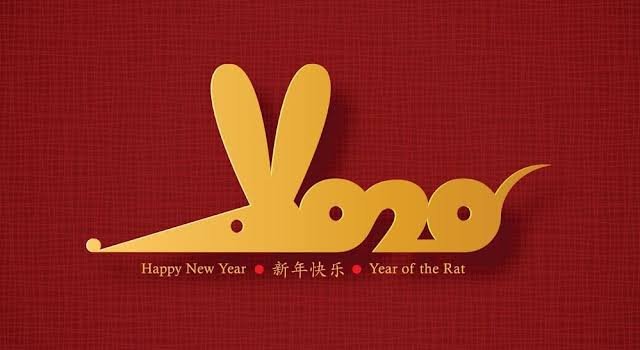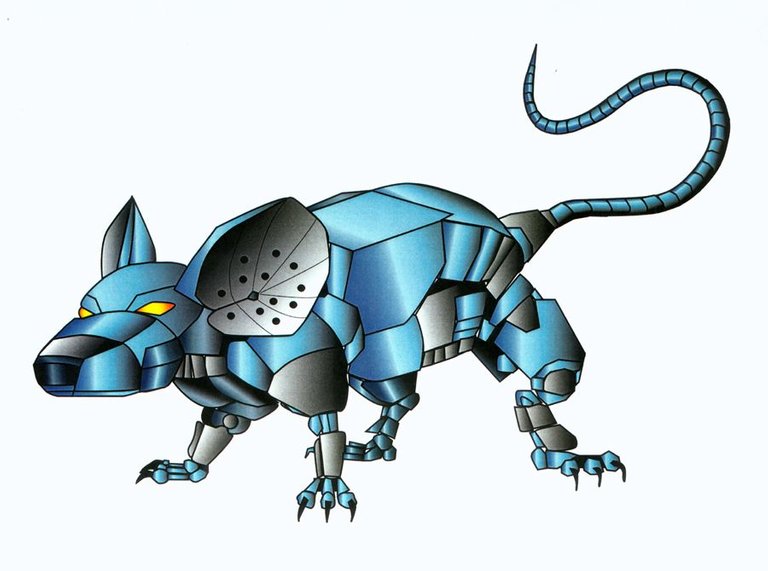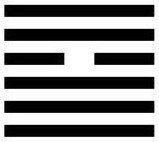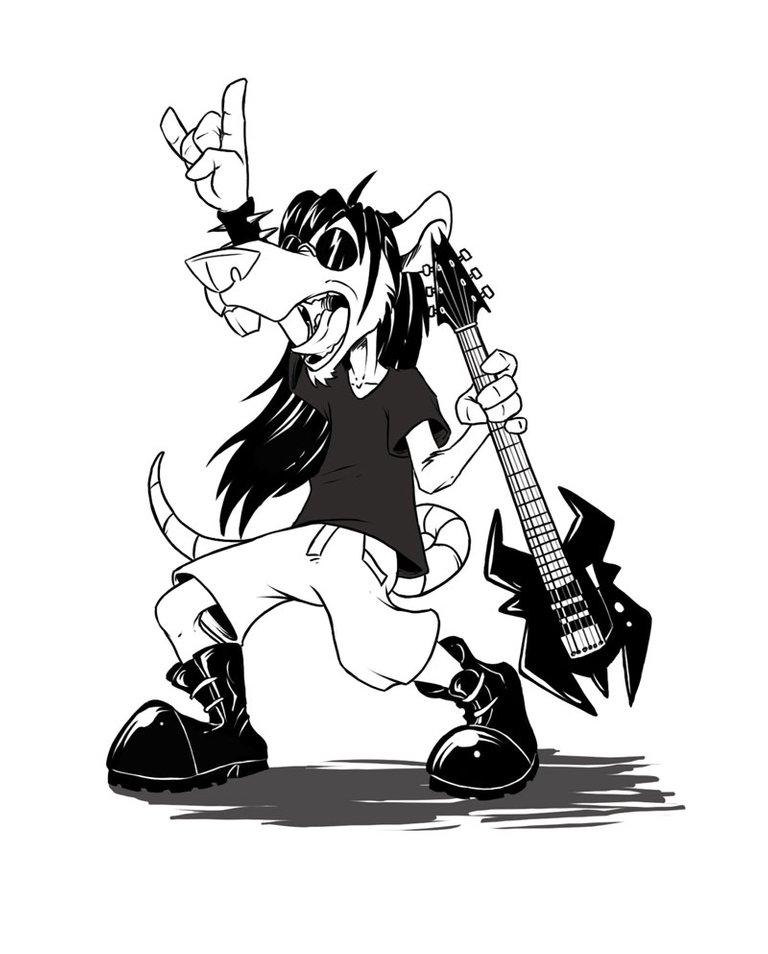Once again it is time for me to delve into the ancient Chinese astrological texts, and contemplate the Taoist and alchemical symbols in preparation for the Lunar New Year on January 25, 2020. Year of the Metal Rat will challenge us to play it small, and accumulate what we need for the new life that we're preparing for.

image source
In 2020 we move into a new phase of a great cycle of 60 years, as described by the ancient Chinese 干支Gānzhī calendar. The new moon on January 25 heralds us into the Lunar Year of 庚子Gēngzǐ, the Yáng Metal Rat.
It’s an important time as the first of five 12-year cycles within the greater sexagenary cycle. Each year is named for each of the twelve Earthly Branches, with 子zǐ (rat) being the first of these. It also has an elemental association, derived from the ten Heavenly Stems. This year’s element is 庚gēng, yáng metal.
Because 子zǐ years come around every twelve years, there are five of them in the sexagenary cycle, each one with a different elemental association — one for each of the five elements. Given that 2020 is a yáng metal year, it means that this element will ‘govern’ or influence the 12-year cycle that it initiates. Thus, while each of the next twelve years will have their own elemental signature, the influence of metal will weave its way through this 12-year cycle.

image source
The bigger picture
What this means is that the next twelve years will have a retreating but transformational influence on the collective. In the bigger picture of the greater 60-year cycle, we are entering into the autumn and harvest time. Being the 37th year of this cycle, we shall be now reaping the fruits of our endeavours, and preparing the ‘winter’ that approaches before the new cycle begins a little over two decades from now.
The twelve year cycle is based on the observations of Jupiter, and the time it takes to pass through the entire zodiac. The gas giant will traverse through the constellation of Capricorn over the next year, bringing its energy of expansion and integration into the field of efficacy and pragmatism. While this won't be a year of getting into the nitty-gritty of minutiae and details, any lofty ideas (or ideologies) will need to 'prove' themselves to be practically effective.
While I'm on the topic of (Western) Astrology, there is another important transit that is occurring this year, and that is Saturn entering Aquarius on the March Equinox. This planet's orbit is longer, so it spends roughly 2.5 years in each sign. The fact that it enters Aquarius on the Equinox is significant, as large, long-term transits are activated by particular events or aspects with other bodies. Saturn is the setter of limitations, boundaries, and containment; it is the natural polarity of Jupiter's expansiveness. Saturn's stoic nature will be placing boundaries around Aquarius' desire for collectivism, and testing all 'airy' ideas of harmony and togetherness for pragmatic efficacy. If we truly want to build a society that is just and equitable for all, then we will need Saturn's often-harsh judgement to have the bravery to reject what just won't work.
As I have written many times before, containment and boundaries can often be more conducive to growth than the open energy of something like Jupiter, as it allows for an accumulation within a confined space — such as a seed — before it bursts the barriers and can expand outwards. Saturn's influence therefore is greatly welcome by 子zǐ.
Herein lies the importance of both Jupiter's and Saturn's influence in the 庚子Gēngzǐ year: if we are gathering the harvest before we retreat indoors, we want to make sure what we're preserving and storing for the winter is going to be nutritious enough to sustain us over that time. If we are going to be "absorbing moisture and nutrition" to gather and accumulate the energy while in seed-form, then we want to ensure the high quality of whatever it is we are absorbing and integrating into ourselves, because that is going to be indicative of the new life that seed will eventually bear forth.
Yáng metal
The Heavenly Stems was a ritual calendar thought to have been used predominantly by the ruling elites and is based on the movement of the stars (see table below).
| 1 | 甲 | jiǎ | yàng | wood |
| 2 | 乙 | yǐ | yīn | wood |
| 3 | 丙 | bǐng | yàng | fire |
| 4 | 丁 | dīng | yīn | fire |
| 5 | 戊 | wù | yàng | earth |
| 6 | 己 | jǐ | yīn | earth |
| 7 | 庚 | gēng | yàng | metal |
| 8 | 辛 | xīn | yīn | metal |
| 9 | 壬 | rèn | yàng | water |
| 10 | 癸 | guǐ | yīn | water |
They are ten manifestations of the five elements, in both yīn and yáng expressions. In the cycle of the Heavenly Stems, 庚gēng signifies the first half of the metal phase. The yáng aspect of this phase is the beginning of a retreating energy. After the peak of outward expression, all things begin to turn inwards, eventually collapsing into themselves. Far be it from being a bad thing, this is useful to enable systems to return to their source.
In the Five Elements system, metal signifies a special type of change and transformation. Metal can be melted down and shaped into any form; more importantly, it can continue to do so. You can whittle a tree down into a chair, but you can't return it to being a tree. With metal, you can 'undo' whatever you have transformed it into; simply melt it down and start again. This is why it is in my opinion the element of 'alchemy' per excellence.
Yáng metal is not the refined product however — it is metal in its rawest form. It is hard, possibly rough, and yet to be transformed into something elegant and refined such as jewellery (this is yīn metal). Yáng metal is also tools however; not particularly elegant, however their simple shape makes them effective for their purpose. An axe is ideal for chopping wood, a spade ideal for shovelling soil, for example. With 庚gēng there is still a lot of unformed potential; we've only just started collecting the fruit of the harvest, but who knows what we will end up with that will tide us over for the winter.
In this sense, if we are going to start pulling energies and influences towards us over the next year, we have to start with a fairly open filter. Pull in what is actually available before sorting through and filtering what is going to be of value to you. As with alchemy and metallurgy, one has to gather and start bringing together the various ingredients before you start the operations.
Rat: Yáng water
The animal zodiac of Chinese Astrology that most of us are familiar with was only introduced to China in the 5th Century by Buddhist scholars, the symbols of the animals being appended to the already ancient Earthly Branches calendar.
| 1 | 子 | zǐ | yàng | water | rat |
| 2 | 丑 | chǒu | yīn | earth | ox |
| 3 | 寅 | yín | yàng | wood | tiger |
| 4 | 卯 | mǎo | yīn | wood | rabbit |
| 5 | 辰 | chén | yàng | earth | dragon |
| 6 | 巳 | sì | yīn | fire | snake |
| 7 | 午 | wǔ | yàng | fire | horse |
| 8 | 未 | wèi | yīn | earth | sheep |
| 9 | 申 | shēn | yàng | metal | monkey |
| 10 | 酉 | yóu | yīn | metal | rooster |
| 11 | 戌 | xū | yàng | earth | dog |
| 12 | 亥 | hài | yīn | water | pig |
This is the form of Horoscope that has become widely popular, so you’ll be able to easily find and read all about the Rat’s temperament anywhere on the Internet. A lot of the interpretations however are somewhat pedestrian, as the 'influence' becomes based more on an idea of how the animal behaves, rather than the traditional, ancient meaning of each of the twelve symbols, based as they are on the observation of time as outlined in the I Ching.
As mentioned, 子zǐ (Rat), is the first sign of the Earthly Branches and thus initiates us into a 12-year cycle. Because this calendrical system is derived from the observation of seasonal variation (the 12 months of the year), this sign is usually associated with the month that immediately follows the Winter Solstice. It corresponds with the water element, which signifies the depths and inner landscapes of the Self. As movement, it is stillness in its purest form.
If Earth-Pig (the previous year's designation) signifies the seed lying dormant deep in the soil, then Rat represents the seed that begins to 'awaken' and begin absorbing moisture and nutrient from its surrounds in order to sprout when the time is right. It combines well with yáng metal energy as we want to harness the natural flow of energy from outside of us, bringing what we need to integrate into ourselves.
'Water and nutrient' signify the resources we need to gather at this initial stage of development —before we sprout and expand outwards, we need to gather the resources that will power that initial boost, and help determine the nature of what will grow over the next cycle. Thus, it is that liminal moment between stillness, and the first stirrings of movement out of that state. In Qìgōng, stillness comes with the full expiration; 子zǐ is the first intake of breath before moving out of stillness.
Accumulating the small
In this form of Astrology, there is always a corresponding symbol from the I Ching which helps explain and illustrate the energetic themes of the year based on a series of calculations. This year, it is the 9th hexagram XIǍO XÙ.

Hexagram 9, 小畜 XIǍO XÙ, ACCUMULATING THE SMALL (original image)
The name of this hexagram comes from 畜 xù, which refers to cattle or domesticated animals, and their rearing. The ancient pictograph from which this character developed shows a field with what appears to bales of feed with a cover over it. So the implication is not just as a noun (the cattle), but also in their raising and nurturance (the feed). This is why the consensus among many translations is on the idea of ‘accumulation’, the building up of what is needed to raise the domesticated beasts as the metaphor for what is required in the context of this moment.
小畜亨。密云不雨自我西郊。
Accumulating the Small is prosperous. Dense clouds but no rain from the western outskirts.
Hexagram 9 小畜 XIǍO XÙ, I Ching (my translation)
Clouds that are dense (and dark) are an accumulation of water vapour; but they haven’t accumulated enough to become so heavy that it rains. So the idea is that the time is not quite right for a project to be achieved, but to keep going with gathering resources.
This is also where some of the interpretation concerns itself with some kind of block to something being achieved — not because there is an obstruction (like a stagnant mass, for example), but because there hasn’t been enough energy/resources accumulated to move forward.
The emphasis of this moment is on the power of restraint, humility, and anything which tames or impedes. This is not a moment for drastic action or grand, sweeping gestures. This summarises what the Year of the Metal Rat is going to bring us. Any growth or development this year will happen in small increments. Minor, seemingly-petty achievements, accumulated over time is the natural flow at this time; gains may be small, but also frequent and consistent over time.
If you're expecting grand, cathartic transformation this year, then don't. A simple, tiny achievement done every day will yield greater results. Consider Æsop's fable of the Hare and the Tortoise.

Hexagram 5,
需 XŪ, NECESSITY
According to the calculations, the final period of the year (signified by the topmost line of the image) is of particular importance and 'changes' the quality of the moment. It reminds us that a period of waning is approaching, where there will be no more accumulating. It warns us that it is not the time to go on any expeditions or journeys, as what is foreseen is trouble. With this line being unstable, changing from yáng to yīn, the hexagram changes to 5/XŪ/WAITING, where we are advised to wait things out, as there is no going anywhere.
Rat on the crossbeam
If the impulse of consciousness this year is to draw in to ourselves the resources we need to make a new start, what are these resources?
They are the lessons we have recently learned: what are we harvesting? What is the fruit we have borne out of our endeavours over the last few years?
In my case for example, it has been the lesson of trust: who can I trust? Do I trust myself? The last few years has brought this issue to my attention, and I’ve had to work hard at healing my trust issues. In particular, trusting my heart with a beloved partner, feeling safe enough to open myself to her, to share my life with her, and to receive and give love with honesty, integrity, and trustworthiness. This healing work is an ongoing process; the lessons I’ve learned in this field is what I will need to draw into myself (absorb) through consciously contemplating what I have learned about myself, what I have learned from making mistakes, and what I have learned from the changes to usual patterns and behaviours in that time. While I have already implemented certain changes over the last few years, this is the year that I am consolidating those changes and embodying them.
I’m not expecting any amazing results or grand transformations however — that is what XIǍO XÙ is reminding me. It’s probably going to seem like nothing is happening, or that nothing is being gained. This is why even in terms of money and finance, this year it will be far better to save and invest small (seemingly insignificant) amounts weekly, regularly.
Making small changes to diet, lifestyle, and behaviour regularly are going to be much better than massive changes. Also, it’s the smallest, most pettiest of things that can be easily changed that are going to be more effective in the long term.

Metal Rat (image source)
Are you feeling lucky?
The thing to keep in mind that all of this information is as if a 'forecast' of the weather. How you adapt and deal with the conditions depends largely on your free will. You can either choose to work with the conditions that the Metal Rat will bring, or not.
That being said, our own astrological temperaments are going to play their part in how and what we choose over the next year. Given everyone loves to have a heads-up and how to deal with things, here are how each of the signs will fare, depending on their own elemental correspondences and how they relate to yáng metal and yáng water.
Those born in years of the Monkey (1944, 1956, 1968, 1980, 1992, 2004) and Dragon (1940, 1952, 1964, 1976, 1988, 2000, 2012) will have their endeavours mutually enforced this year. Needless to say, it will be naturally fortuitous for anyone born in the year of the Rat (1948, 1960, 1972, 1984, 1996, 2008).
Those born in the year of the Ox (1949, 1961, 1973, 1985, 1997, 2009) will have a particularly productive year, as yáng water greatly nurtures this sign.
This year will not be so great for those born in the year of the Horse (1954, 1966, 1978, 1990, 2002) or Sheep (1943, 1955, 1967, 1979, 1991, 2003), being naturally challenged and antagonised by the energy of yáng water.
Those born in the year of the Rabbit (1951, 1963, 1975, 1987, 1999, 2011) have to be on alert, as it is said that Rabbit and Rat are a 'strongly harassing pair'.
Those who have yīn wood (乙 yǐ ) as their Day-Master will also feel supported throughout the year by the 'climate' of yáng metal, while those with yáng wood (甲 jiǎ ) will be put through particular stress and challenge.
It is important to note here that the importance of the Day-Master needs to be taken into consideration with the elements found throughout the whole chart in order to determine one's 'luck element'. In general, this year the yáng metal element of the Heavenly Stem will influence 'luck elements' as so:
- Earth — drained, bad luck
- Metal — good luck
- Water — nourished, nurtured, will grow in time
- Wood — constrained or blocked luck
- Fire — average luck
Keep in mind that everyone’s astrological chart is unique, and a proper interpretation is required with year, month, day, and birth time details to determine the various factors that will play out in 2020. There are many websites and Chinese astrologers online for you to find this information.
I invite you to contact me directly if you would like me to put together this information for you with detailed, personal report.
Astrological consultations available in exchange for LOTUS tokens.





This post originally appeared at Pandora’s Lost Gift.











Oh this astrology is a lot of fun. Thanks for this general interpretation for the upcoming cycle. I don't know if i have enough lotus or not but i would be interested in a reading if i can afford one!
I don't set 'prices' for anything I offer in exchange for LOTUS.... I prefer to work on the basis of making an exchange based on your evaluation of what value it brings to you. Everyone sets 'value' on different things in different ways.
😊🙏🏽☯️